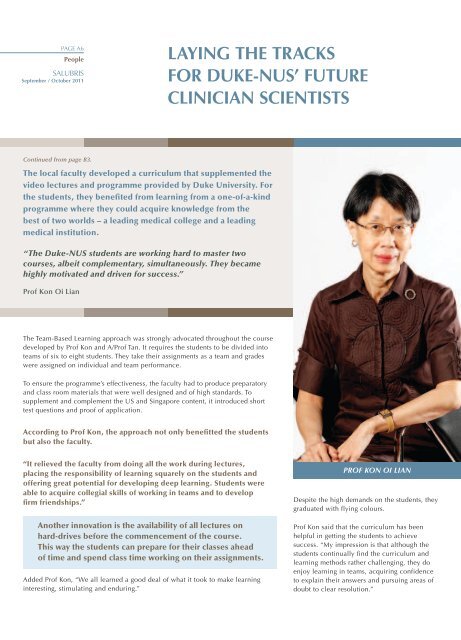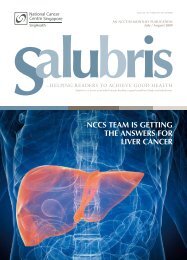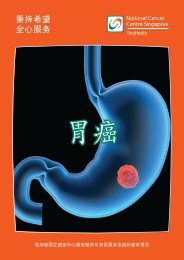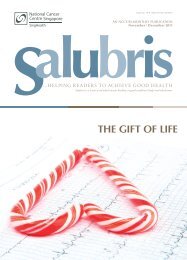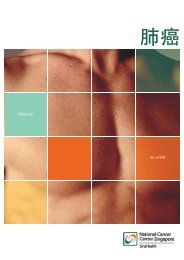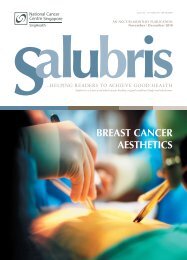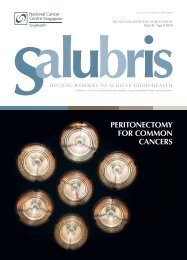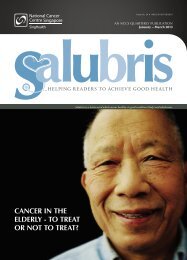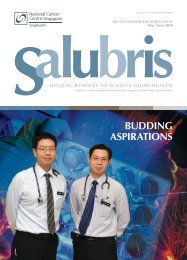QUALITY OF LIFE - National Cancer Centre Singapore
QUALITY OF LIFE - National Cancer Centre Singapore
QUALITY OF LIFE - National Cancer Centre Singapore
You also want an ePaper? Increase the reach of your titles
YUMPU automatically turns print PDFs into web optimized ePapers that Google loves.
PAGE A6<br />
People<br />
SALUBRIS<br />
September / October 2011<br />
LAYING THE TRACKS<br />
FOR DUKE-NUS’ FUTURE<br />
CLINICIAN SCIENTISTS<br />
PAGE A7<br />
People<br />
SALUBRIS<br />
September / October 2011<br />
Continued from page B3.<br />
The local faculty developed a curriculum that supplemented the<br />
video lectures and programme provided by Duke University. For<br />
the students, they benefited from learning from a one-of-a-kind<br />
programme where they could acquire knowledge from the<br />
What needs to be addressed now is how the curriculum can continue<br />
to be engaging for the next batch of students. Both professors already<br />
have some new learning strategies in mind. Their priority is to put<br />
together materials that maximise the students’ learning.<br />
best of two worlds – a leading medical college and a leading<br />
medical institution.<br />
“The Duke-NUS students are working hard to master two<br />
courses, albeit complementary, simultaneously. They became<br />
highly motivated and driven for success.”<br />
“The students can learn how to prioritise their preparation for<br />
class sessions with clearer direction from the faculty. It may<br />
help that they understand the rational framework for each topic<br />
before the inundation of facts and factoids. Reading materials<br />
can also be more appropriately selected and realistically scaled<br />
to the preparation time that students have.”<br />
Prof Kon Oi Lian<br />
Prof Koong Heng Nung<br />
The Team-Based Learning approach was strongly advocated throughout the course<br />
developed by Prof Kon and A/Prof Tan. It requires the students to be divided into<br />
teams of six to eight students. They take their assignments as a team and grades<br />
were assigned on individual and team performance.<br />
To ensure the programme’s effectiveness, the faculty had to produce preparatory<br />
and class room materials that were well designed and of high standards. To<br />
supplement and complement the US and <strong>Singapore</strong> content, it introduced short<br />
test questions and proof of application.<br />
A/Prof Tan believes that the new curriculum should also be about helping the<br />
students focus on what is really important and to make them feel the pulse of<br />
research. “One important work-in-progress we have lies in getting the faculty<br />
members to list the key learning objectives of each team-based learning session<br />
and striking a balance between pet topics of faculty members and key general<br />
concepts. We should also get students to be excited about research, and let<br />
them witness how discoveries, translated from bench to bedside, can radically<br />
transform and improve clinical practice. If we can achieve this, then I am sure<br />
we have succeeded.”<br />
According to Prof Kon, the approach not only benefitted the students<br />
but also the faculty.<br />
“It relieved the faculty from doing all the work during lectures,<br />
placing the responsibility of learning squarely on the students and<br />
offering great potential for developing deep learning. Students were<br />
able to acquire collegial skills of working in teams and to develop<br />
firm friendships.”<br />
Another innovation is the availability of all lectures on<br />
hard-drives before the commencement of the course.<br />
This way the students can prepare for their classes ahead<br />
of time and spend class time working on their assignments.<br />
Added Prof Kon, “We all learned a good deal of what it took to make learning<br />
interesting, stimulating and enduring.”<br />
PR<strong>OF</strong> KON OI LIAN<br />
Despite the high demands on the students, they<br />
graduated with flying colours.<br />
Prof Kon said that the curriculum has been<br />
helpful in getting the students to achieve<br />
success. “My impression is that although the<br />
students continually find the curriculum and<br />
learning methods rather challenging, they do<br />
enjoy learning in teams, acquiring confidence<br />
to explain their answers and pursuing areas of<br />
doubt to clear resolution.”<br />
The commitment shown by our clinicians and scientists in their quest<br />
for a better curriculum has also made an impression on the current<br />
batch of students such as Mr Christopher Ross Schlieve of Class<br />
2013. Motivated by Prof Koong, who was conferred the Pioneer and<br />
Outstanding Educator Awards. Mr Schlieve decided to enroll into the<br />
surgical clerkship elective and has not looked back since.<br />
He said ”Prof Koong is constantly thinking of new and unique ways to engage us<br />
as learners. He has devised a multitude of learning tools that has maximised our<br />
learning within the clerkship.”<br />
His colleague, Ms Fatima Usmani could not agree more. “Prof Koong’s<br />
commitment to our learning made itself evident repeatedly during our surgical<br />
clerkship as he taught me and my colleagues to extract valuable conceptual<br />
lessons from seemingly mundane clinical experience. By glancing at our answers,<br />
addressing our approaches and giving us constructive feedback, he effectively<br />
created an environment in which we were able to question, reflect, learn from one<br />
another, and address our own weaknesses.”<br />
PR<strong>OF</strong> KOONG HENG NUNG<br />
To date, 16 NCCS staff members are<br />
holding teaching positions at the<br />
medical school. NCCS Director Prof Soo<br />
Khee Chee leads the team as the Duke-<br />
NUS Vice Dean of Clinical and Faculty<br />
Affairs. In shouldering this added<br />
responsibility they are paving the way<br />
for NCCS to attain its goal of becoming<br />
a global leading cancer centre in patient<br />
care and research, as well as education.<br />
By Veronica Lee


